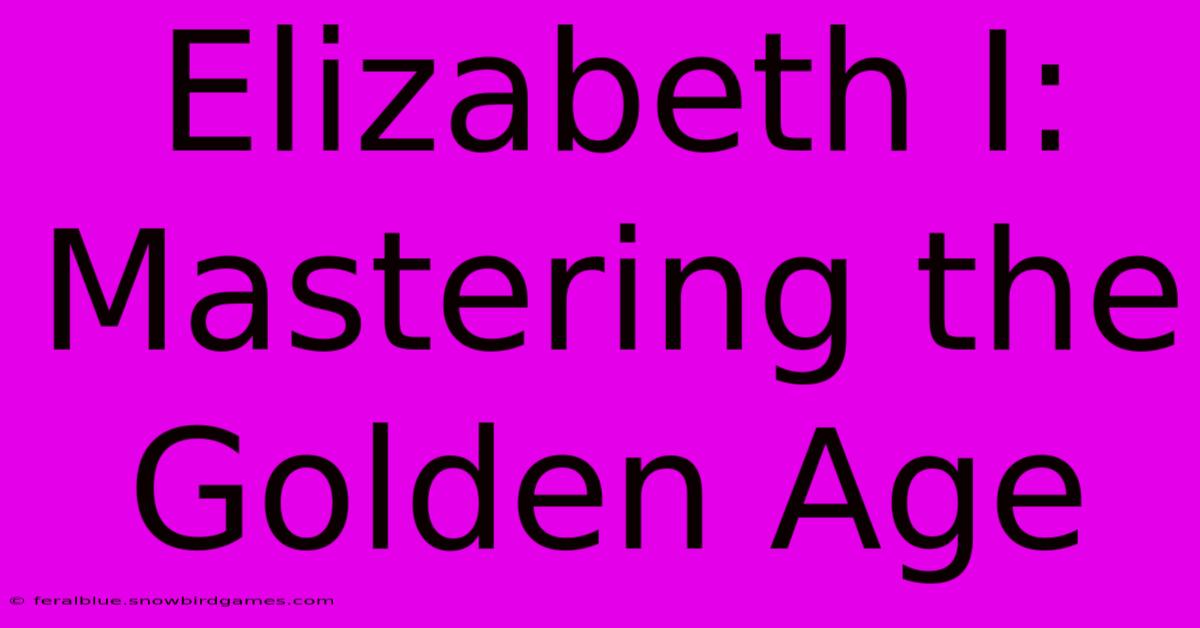Elizabeth I: Mastering The Golden Age

Table of Contents
Elizabeth I: Mastering the Golden Age
Queen Elizabeth I's reign (1558-1603) remains a captivating period in English history, often lauded as the "Golden Age." But how did this shrewd and complex woman navigate the treacherous political landscape and forge an era of unprecedented cultural flourishing? This exploration delves into the key strategies and decisions that cemented Elizabeth I's legacy as a master of her time.
Navigating a Turbulent Political Landscape
Elizabeth inherited a kingdom fractured by religious conflict and simmering international tensions. The previous reigns of her siblings, Mary I and Edward VI, had highlighted the deep divisions within England. Elizabeth’s genius lay in her ability to skillfully navigate these challenges, employing a series of calculated moves to consolidate her power and secure her throne.
Religious Policy: A Delicate Balance
The religious question was paramount. Elizabeth cleverly avoided the extremes of Catholicism and Protestantism, adopting a policy of moderate Anglicanism known as the Elizabethan Religious Settlement. This pragmatic approach, while not universally popular, successfully minimized religious conflict and allowed for a degree of religious tolerance, albeit a limited one. This masterful compromise was crucial in maintaining domestic peace and preventing further bloodshed.
Foreign Policy: Maintaining Peace and Power
Elizabeth faced formidable adversaries, notably Spain under Philip II. Her astute foreign policy, characterized by skillful diplomacy and calculated alliances, helped avoid large-scale wars while maintaining England's independence and prestige. She cleverly played European powers against each other, securing favorable trade deals and preventing any single nation from becoming too powerful. The defeat of the Spanish Armada in 1588, a pivotal moment in her reign, solidified England's position as a major European power and further cemented her reputation as a shrewd strategist.
Fostering the Golden Age of Culture and Arts
Elizabeth's reign witnessed an extraordinary flourishing of arts and culture, an era remembered for its literary achievements, theatrical innovations, and architectural marvels. This wasn't a mere coincidence; Elizabeth actively patronized the arts, recognizing their power to enhance her image and project England's growing influence.
The Flowering of English Literature
The Elizabethan era saw the emergence of literary giants such as William Shakespeare and Christopher Marlowe. Elizabeth's court became a center of intellectual and artistic activity, fostering an environment where creativity could thrive. Patronage, both royal and aristocratic, played a critical role in supporting playwrights, poets, and writers, shaping the distinctive character of Elizabethan literature.
Architectural Marvels and Urban Development
London experienced significant urban development during Elizabeth's reign. The construction of impressive buildings and the expansion of existing structures reflected the growing wealth and power of the nation. Architectural styles evolved, reflecting both Renaissance influences and distinctively English traditions.
The Rise of the Theatre
The Elizabethan theater reached its peak, with the construction of famous playhouses like the Globe Theatre. Shakespeare's works, performed for audiences of all social classes, became a defining feature of the era, contributing significantly to the national identity and cultural prestige.
The Virgin Queen: Image and Propaganda
Elizabeth skillfully cultivated her image as the "Virgin Queen," a powerful and independent ruler who remained unmarried throughout her reign. This deliberate strategy served multiple purposes. It eliminated the possibility of a dynastic crisis that might arise from a marriage to a foreign power and reinforced her authority by presenting her as single-mindedly dedicated to her kingdom. This image was carefully crafted and disseminated through propaganda, portraits, and official pronouncements, further solidifying her legendary status.
A Lasting Legacy
Elizabeth I’s reign remains a testament to her remarkable political acumen, strategic vision, and profound understanding of power. Her successful navigation of religious and political turmoil, coupled with her patronage of the arts, created a golden age that continues to inspire awe and fascination centuries later. Her legacy extends beyond the realm of politics and culture; it serves as a powerful example of effective leadership and the enduring influence of a strong, visionary leader.

Thank you for visiting our website wich cover about Elizabeth I: Mastering The Golden Age. We hope the information provided has been useful to you. Feel free to contact us if you have any questions or need further assistance. See you next time and dont miss to bookmark.
Featured Posts
-
Unveiling Flavio Briatores Net Worth
Apr 03, 2025
-
Amy Hunt A Daughters Pursuit Of Happiness
Apr 03, 2025
-
Ngina Kenyatta Uhurus Daughters Elusive Age
Apr 03, 2025
-
Branko Babics Net Worth Surprising Insights
Apr 03, 2025
-
Stradivarius Mom Jeans Look And Feel Amazing
Apr 03, 2025
